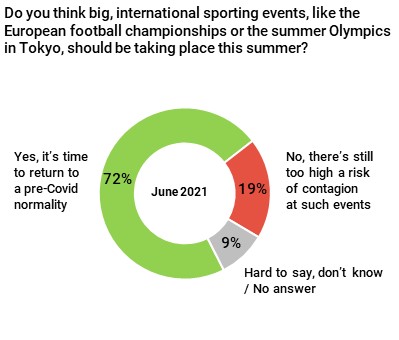27/2021
2021-09-16
Should Big Sporting Events Take Place during the Pandemic?
The European football championships, UEFA Euro 2020, finished recently, having been put back by a year. The Tokyo summer Olympic Games planned for last year were also moved back to July-August of this year. In June we asked people if they thought such international sporting events should be taking place at all this summer. Almost three quarters (72%) of adult Poles were of the opinion that it was time, in this respect, to return to a pre-Covid normality, while virtually one fifth (19%) thought the time for such events had not come yet, as there was still too high a risk of contagion at them. One in eleven (9%) of those asked did not have an opinion on the subject.

|
Opinions on the subject were most divided on grounds of age. Older people tended to be more cautious, but even in the over-65 age group the majority (58%) were in favour of the return of big sporting events this summer. The most numerous proponents of a return to pre-pandemic normality were the youngest respondents (88% of the 18–24 age group). Moreover, men wanted the return of big sporting events much more frequently than women (77% as against 66%), while women were much more likely to be convinced that such events carried too high a risk of contagion (23% as against 14%).
More on this subject in the Football and UEFA Euro 2020 report.
This ‘Current Events and Problems’ survey (373) was conducted using a mixed-mode procedure on a representative sample of named adult residents of Poland, randomly selected from the National Identity Number (PESEL) register.
Respondents independently selected one of the following methods:
– Computer Assisted Personal Interview (CAPI);
– Computer Assisted Telephone Interview (CATI), respondents receiving researchers’ telephone numbers in an introductory letter from CBOS;
– Computer Assisted Web Interview (CAWI), where respondents filled in the online questionnaire independently, gaining access by means of a login and password provided in an introductory letter from CBOS.
– Computer Assisted Personal Interview (CAPI);
– Computer Assisted Telephone Interview (CATI), respondents receiving researchers’ telephone numbers in an introductory letter from CBOS;
– Computer Assisted Web Interview (CAWI), where respondents filled in the online questionnaire independently, gaining access by means of a login and password provided in an introductory letter from CBOS.
In all three cases the questionnaire had the same structure and comprised the same questions. The survey was carried out between 7 – 17 June 2021 inclusive on a sample of 1218 people (60.8% using the CAPI method, 26.7% CATI and 12.6% CAWI).
CBOS has been conducting statutory research using the above procedure since May 2020, stating in each case the percentage of personal, telephone and internet interviews.





